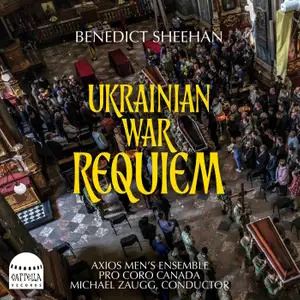
Benedict Sheehan (b. 1980)
Ukrainian War Requiem (2024)
Axios Men’s Ensemble, tenors and basses of Pro Coro Canada/Michael Zaugg
Yuliia Zasimova (soprano); John Tessier (tenor)
rec. 2024, St. Basil the Great Ukrainian Catholic Parish, Edmonton, Alberta, Canada
Sung texts in English, Ukrainian and Latin with translations enclosed
Reviewed as download
Cappella Records CR 432 [67]
In the foreword to this issue Dr. Deacon Nicholas Denysenko writes:
“War is more than a series of disturbing images on a screen. War destroys homes and upends lives. War is especially raw for those whose loved ones die on the battlefield. The world eventually moves forward. Economies are rebuilt, and the human spirit wills survivors to rise from the rubble of wreckage. But survivors never forget. Each and every day, they remember their husbands and wives, fathers and mothers, siblings and friends who fought for freedom. For the love of nation. For the love of God. Ukrainians are very good at remembering the dead because they have lost so many lives to war. The Ukrainian-Soviet War of 1917–21, the Holodomor of 1932–33, and World War II claimed millions of Ukrainian lives. Ukrainians remember the dead in a beloved ritual called a panakhyda—a type of vigil centered on song. Mourners stand before God, in solidarity with survivors, and sing a panakhyda. It is a ritual reflecting on life and death, a lament of grief and loss, and of hope. Russia’s illegal invasion of Ukraine has created an unprecedented human catastrophe. Tens of thousands of Ukrainian soldiers and civilians have been killed, and the number is growing by the day. Russia’s brutal, genocidal attack has added a new layer of death upon death.”
I recently reviewed Benedict Sheehan’s Akathist and wrote as strapline: “A deeply felt, very beautiful work which should bring hope to the world of today.” These words could just as well be applied to this new work, even though mourning is central in a requiem. For this purpose he has employed various sources of existing texts and music. To mirror the manifoldness of Ukraine’s cultural heritage, a variety of musical influences is manifold and the text is trilingual: English, Ukrainian and Latin. Here is Ukrainian and Galician plainchant (somoilka), Gregorian chant, a Ukrainian Jewish psalm tone (nusach), but also a lot of original compositions. There is, however, a unifying factor in the shape of a leitmotif: the Ukrainian national anthem, Shche Ne Vmerla Ukraïna by Mykhailo Verbytskyi, which appears in various disguises in all twelve movements, bar the penultimate movement. Sheehan motivates this: “I intentionally chose to leave out the national anthem as a way of honouring the tragic loss of Ukrainian life and liberty.“ As a climax it returns with inspiring power in the concluding In Paradisum at the words on the words in civitatem sanctam Jerusalem (into the holy city of
Jerusalem) expressing the hope that one day Ukraine will rise from the ashes.
As I’ve already mentioned the music is very beautiful, and the singing of the gigantic male choir is mightily impressive, not only for its power but also as much for its beauty of tone. Axios is certainly a Canadian choir, but a majority of the singers have Ukrainian Catholic and Orthodox backgrounds, which in itself lends authenticity to the recording. Having myself been singing in male choirs for many years, I feel that this is the real thing that is unattainable for most West-European choirs, even though we in Sweden are famous for the quality of our choirs. The closest I’ve come was many years ago, when we had an exchange with a choir from Eastern Finland. Their basses had almost bottomless voices. Since there are several minor solo contributions here, one can hear that there is high quality casting also in this respect. The two feature soloists, tenor John Tessier and soprano Yuliia Zasimova are topnotch in both opera and concert singing. Moreover, Ms Zasimova is Ukrainian, which is another asset. Tessier, who has appeared both at La Scala and Covent Garden, has a lot to do, while Zasimova appears only in the first and last movements. She presents an appealing contrast to all the male voices, and in In Paradisum her entrance is as if she were an angel, a messenger from God, telling the suffering and mourning that Paradise is open for the believers. It is very touching indeed.
The issue of this disc is timed to commemorate the Russian invasion of Ukraine three years ago, reminding us all of its terrible consequences.
Göran Forsling
Buying this recording via a link below generates revenue for MWI, which helps the site remain free


















